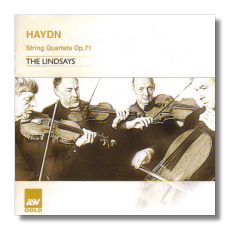
The Internet's Premier Classical Music Source
Related Links
- F.J. Haydn Reviews
- Latest Reviews
- More Reviews
-
By Composer
-
Collections
DVD & Blu-ray
Books
Concert Reviews
Articles/Interviews
Software
Audio
Search Amazon
Recommended Links
Site News
 CD Review
CD Review
Franz Joseph Haydn

String Quartets, Op. 71 #1-3
- Quartet for Strings in B Flat Major, Op. 71 #1 (Hob. III:69)
- Quartet for Strings in D Major, Op. 71 #2 (Hob. III:70)
- Quartet for Strings in E Flat Major, Op. 71 #3 (Hob. III:71)
The Lindsey String Quartet
Academy Sound & Vision Gold GLD4012 68m DDD
The Lindsays' ongoing Haydn and Schubert series are slowly shaping into two projects of formidable and at the same time treasurable interpretations. The previous Haydn discs including the 6 Op. 50 quartets came in for some rave reviews and this latest disc will certainly garner the same accolades.
The 3 quartets under review were composed by Haydn in 1793 in Vienna and with the 3 Quartets, Op. 74, the composer was planning their performance during his up and coming second London visit. These 6 works were published in two groups of three in 1795 and 1796 respectively. Possibly commissioned by Count Anton Georg Apponyi, an old friend of the composer who had sponsored Haydn's initiation in the Masonic Lodge and was later to make good for the costs of the performances of 'The Creation' and 'The Seasons'.
While Haydn's previous quartets were designed for private performances, the Op. 71 were specifically composed with the Hanover Square Rooms in mind, a place that could seat around 800 people. With this objective in mind the Op. 71 are more boldly and sparingly conceived with powerful 'quasi' orchestral sonorities. Haydn gives virtuoso parts to all the instruments, especially the first violin with contrasts of texture, register and dynamics being colourful and flamboyant.
Haydn never cultivated brilliance for its own sake, but these quartets, when compared with those of Gyrowetz and Haydn's pupil, Pleyel, are more outstanding in their themes, more imaginative in their texture and harmonies and above all, more tautly organized. The Lindsays interpret these works as if they have played them all their lives. Every nuance in the music is brought to light, and the brilliant sound of their remarkable instruments manages to cloth these works with an aura of universal energy. Another triumph for these unassuming but wonderful musicians which is most wholeheartedly recommended.
Copyright © 2005, Gerald Fenech



















